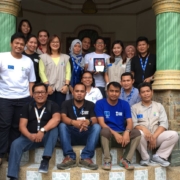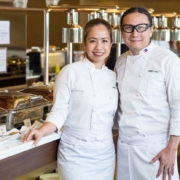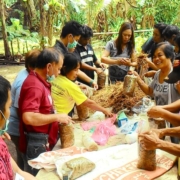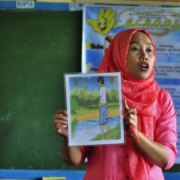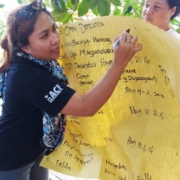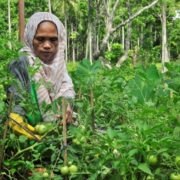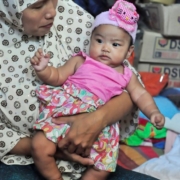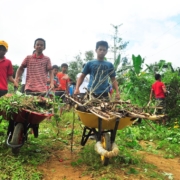10 TUKLAS INNOVATIONS GET UNDERWAY IN MINDANAO
After a series of reviews done by the Tungo sa Kahandaan ng Pilipinas (TUKLAS) Innovation Lab, 40 out of 72 innovations were chosen for the final review. The final 40 and their ideas are now being supported as TUKLAS Innovators and Innovation Teams.
10 of these 40 innovations are now in the stage of developing its prototype in some Mindanao communities. These prototypes are: 1) DisP(ner) Bag, a weather-proof emergency bag that can be used for multiple purposes, such as a floater or tent; 2) Popularizing Indigenous Early Warning Systems, a system of documenting and popularizing indigenous knowledge on early warning for disaster risk reduction; 3) Bamboo River Embankment, a bamboo dike embankment to mitigate the impact of frequent flooding and soil erosion; 4) Matigam Kaw Iso: Mandaya Children’s Active Participation, an innovation on encouraging participation of children from hazard-prone, indigenous people communities in disaster risk management through a child-to-child approach; 5) Formulating Innovative Resiliency reduction program and manual; 6) Disaster Resiliency Fund, a community- managed, savings program for disaster preparedness activities of coastal communities; 7) People’s Initiative and Involvement in the Development of Technology (PINDOT), an offline mobile application for emergency reporting, and mapping of vulnerable families; 8) Promoting Cultural Innovation for Increased Resilience of Children, a facilitation of peace modules and cultural exchange to support the recovery of children affected by armed-conflict; 9) Growing Food, Saving Lives, use of urban gardening as an approach to community building and coping with post-disaster trauma among internally displaced persons from Marawi City; and 10) Early-Warning and Early Response Mechanisms for Armed-Conflict, a community-based mechanism to prevent and mitigate impact of armed-conflict and other human-induced disasters. In Filipino, ‘tuklas’ means ‘discover’, thus the TUKLAS Innovation Lab aims to identify innovative ideas and entrepreneurs across the country.
Hosted by Plan International and in partnership with Action Against Hunger, CARE, and the Citizens Disaster Response Centre (CDRC) which is a local civil society organization (CSO), TUKLAS has a collective experience of 174 years working from within the communities in the Philippines to improve emergency preparedness and response.
The TUKLAS Innovation Lab reaches out through networks of CSOs, community groups and leaders, businesses, academics, inventors and inspired youth to identify, test, and refine innovative ideas and methods to strengthen communities’ response and preparedness to disaster across the country, taking a bottom-up or user-centered approach to nurture, test, and scale promising models that will address gaps to improve emergency preparedness in the disaster prone country. ●


